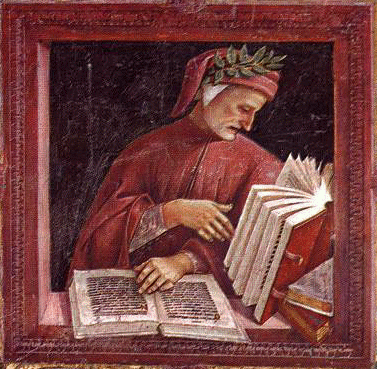
The Fedeli d’Amore and Dante
==================================

 Immanuel the Roman's Critique of Dante's Divine Comedy and Maimonides' Guide for the Perplexed
Immanuel the Roman's Critique of Dante's Divine Comedy and Maimonides' Guide for the Perplexed
Keywords : Beatrice Portinari, Dante Alighieri, Dino Compagni, Divine Comedy, Fedeli d'Amore, Guido Cavalcanti, Sapientia, Shaked
The Fedeli d’Amore (faithful of love) were according to some scholars a group composed mainly of Italian poets working in the 13th-14th centuries.
Guido Cavalcanti was the leader of the group and the ladies the poets worshiped under names like Selveggia and Beatrice were not flesh and bones but realizations of the ideal Sapientia – The goddess Wisdom. Dino Compagni called his lady for example Madonna Intelligenza. Henry Corbin suggests rather that the Fedeli d’Amore saw Sapientia and a particular early figure at the same time, but the vision was visible only to each one of them at each time.
According to Valli, the group of the Fedeli d’Amore was a secret group devoted to Sapientia (wisdom). They used a secret language in which certain words had multiple meanings. For example, Donna meant Sapientia or a member of the sect, etc…
The main theme of this group: The man with a gentle heart (cor gentile) is trained by love to understand the lady and surrender all his soul to her effect. [1]
There are constant references in these group’s writings for the need for secrecy and discretion. Valli suggested that later Boccaccio, in order to safeguard the secrets of the group from the inquisition as heresy, identified Beatrice with Beatrice Portinari.
These poets searched to attain the active intellect. For the intellect is higher than ratio and is the cognition the angels enjoy fully and man only imperfectly.
According to Aristotle it was usually understood that men had the potential knowledge of things and to a varied degree shared this knowledge. This knowledge was realized by the radiating force named the active intellect. This active intellect was a quasi supernatural force sometimes called the Angel or Sapientia. To many of the Fedeli d’Amore poets the lady was the active intellect, bringing realization to their hidden potentials of understanding. The lady therefore was a personification of the active intellect in these poets’ writings.
The danger as far as the church was concerned was that by finding his individual path to divine knowledge using the figure of the lady, the Fedele d’Amore no longer needed and used the mediation of the church and attained it independently of its teachings.
-----------------------------------------------------
[1] For the theory of the Fedeli d’Amore, see: Anderson, William. Dante the Maker. London: Routledge & Kegan Paul, 1980
© 2005, 2007 (ed.)
Dear visitor, please take a short moment to sign my guest book!
----------------------------------------------------------------

© 2001 Emails are
gladly received
ORIGINAL
MUSIC BY THE AUTHOR!
The Poetry
of Manoello Romano : Biography, Writings, Short Poems
Other articles by G. Shaked:
ART
BIOLOGY
CINEMA
MUSIC
PHILOSOPHY
PHYSICS
(ACOUSTICS)